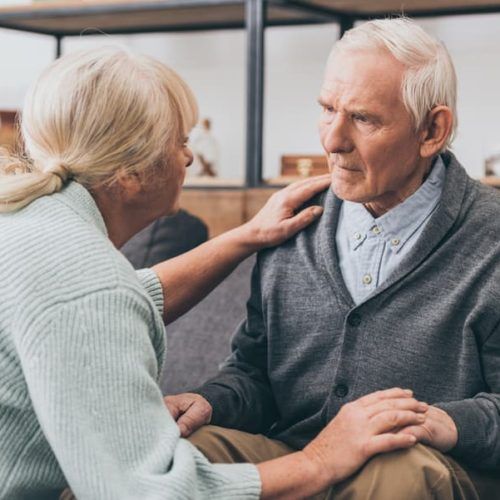What You Should Not Say to Someone with Dementia

Have you ever said something to someone with dementia or Alzheimer’s and as it was coming out of your mouth you wished you could stop it? I know I have and would have given anything to take it back. That is because dementia is a disease of the brain that impairs your memory and judgment. It interferes with a person’s social skills, and thinking abilities, making it harder for them to function normally. Their brain does not process information like normal. Speaking to a person with dementia requires patience and the ability to know what not to say.
Here are some things you should never say to someone with Dementia.
⇨ Do you remember? When poised with this question, the person may get frustrated and angry because they can’t remember. This may cause irritation between you and them as you may not understand why they are so upset. They may try so hard to remember and begin to cry when they just can’t remember the time, place, or person to whom you are referring. So, please don’t ask an Alzheimer’s or Dementia person, do you remember?
⇨ That person died years ago. A person with dementia has no reality of time passing. To them “Uncle Joe” may have passed six years ago, but to them Uncle Joe is still alive and kicking. Sometimes, dementia patients can long for their parents, who have passed away many years ago, the best way to manage this situation is to ask them to tell you about their parents. Telling the patient their parents have passed away could cause more stress and anxiety.
⇨ You’re not right. Dementia patients say things they believe are true, in their heads these things happened. The most important thing is to NOT disagree with them. Most of the time what they are talking about has happened, but it was so long ago, you may have no idea it really happened.
⇨ Never argue with a dementia patient. Should someone with dementia become angry and unruly and start arguing with you, do NOT argue back, try to redirect the conversation off the subject onto something pleasant. The most important thing is to keep the patient calm and relaxed.
⇨ Talk simply. Never use complex sentences, you will only confuse the person. Use simple, everyday words, as if you are talking to a child. The brain of a dementia patient cannot process or comprehend complex sentences and once again, anxiety and frustration will become prevalent.
⇨ I told you. Never point out that they are wrong. As in “you’re not right” the patient feels what they’re talking about really happened and it probably did before your time. Let them have it as long as it’s not hurting anyone.
⇨ Questions about their past. Don’t ask a dementia patient questions about their past, they will become very anxious because they can’t remember. This leads to high stress levels and could cause friction between you and them. Instead, ask if they’d like to hear about your past and where you grew up, etc.
How do you have a successful conversation with a dementia patient? Go somewhere quiet without distractions, speak softly, quietly, and make eye contact. Speak in slow, short sentences, make sure you give them plenty of time to respond, remember, their brain takes longer to process. BE PATIENT!! Pay attention to your body language, use facial expressions and gestures to help with your point. Always stay in the present moment and stay positive! And, above all, BE PATIENT!!!
If you are caring for someone with Alzheimer’s or a related dementia, we at Assisted Living Made Simple hold four Alzheimer’s caregiver support groups a month. They are designed to provide emotional, educational, and social support to those who are caring for someone with this debilitating disease. Please call our office for a location near you at 386-847-2322.




